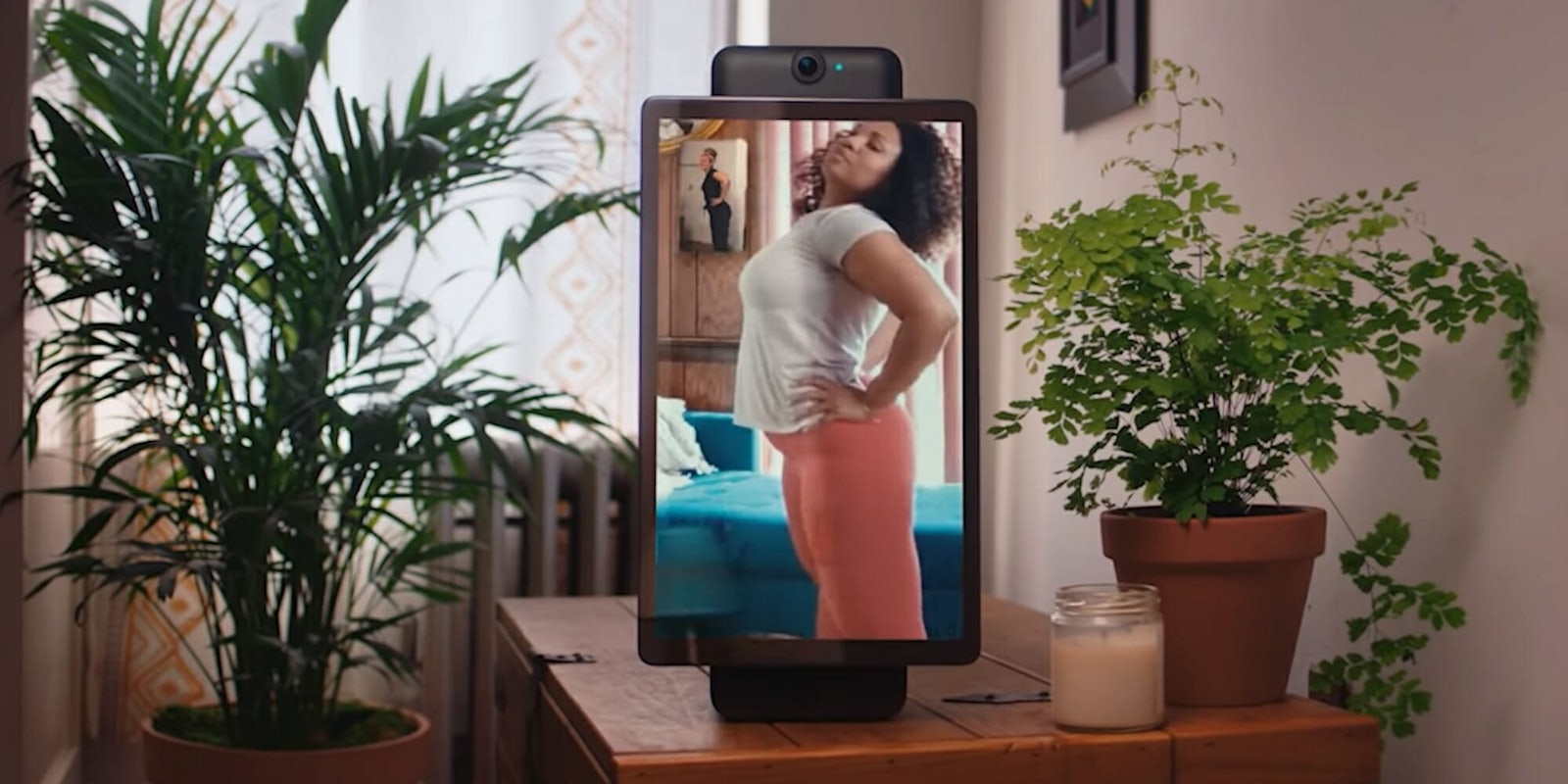You may want to rethink that Facebook Portal pre-order. After initially claiming that the Alexa-powered video caller won’t collect any data on its customers, Facebook revealed yesterday that the Portal will scrape information on users’ call length, call frequency, and app usage, which could all be used for targeted ads on other Facebook platforms.
Yikes.
After the Facebook Portal was introduced to the world earlier this month, Portal’s product VP head Rafa Camargo claimed that the Facebook Portal would not collect any data for Facebook ads, nor would it have any ads at all, according to Recode. But then Facebook stepped in and corrected Camargo: Yes, Portal won’t have ads, but it still grabs plenty of data on users’ calls.
“Portal voice calling is built on the Messenger infrastructure, so when you make a video call on Portal, we collect the same types of information (i.e. usage data such as length of calls, frequency of calls) that we collect on other Messenger-enabled devices,” one Facebook spokesperson told Recode. “We may use this information to inform the ads we show you across our platforms. Other general usage data, such as aggregate usage of apps, etc., may also feed into the information that we use to serve ads.”
In short, when you make a video call with Portal, Facebook will know who you’re calling, how often you call them, how long you’re calling, and it could use that data to influence advertisement data on other Facebook apps, such Instagram or Facebook on iOS. Camargo later confirmed that call data can be collected on the Portal, but he isn’t sure if it will be used for ads on other platforms.
“I think [my colleague] was intending to say that we don’t intend to use it,” Camargo explained to Recode. “Potentially, it could be used.”
It’s no secret that Facebook has its hands in as much user data as possible for advertisement purposes. Facebook collects information on everything from where users access Facebook to their text messages on Android. The company even receives financial data from six different companies on individuals’ investable assets, household income, and transaction locations. All this data fuels a powerful algorithmic advertisement campaign where anyone can advertise their products on the service and reach the perfect customer.
Facebook isn’t transparent about its data surveillance capabilities, nor is it necessarily honest about its advertisements’ effectiveness, either. Case in point, Facebook is facing a lawsuit alleging the social media giant purposefully inflated its average video viewership metrics by “some 150-900 percent” in order to convince advertisers to buy pricey video ad slots.
“Facebook did not wish to draw scrutiny to its viewership figures because it knows that the majority of video ads on its platform are viewed for very short periods of time—users scroll right past,” the lawsuit reads, via Ars Technica. “If advertisers were more widely aware of this fact, and in particular, if they knew that their advertisements were among those that were not drawing viewers’ attention, they would be less likely to continue buying video advertising from Facebook.”
Suffice to say, tech Twitter isn’t exactly surprised by Facebook Portal’s data-collection abilities.
Thank you for this beautiful, wooden horse, Facebook! We shall display it prominently in our home! https://t.co/EPJJuF2jzF
— M.G. Siegler (@mgsiegler) October 16, 2018
https://twitter.com/darth/status/1052366908664639490
https://twitter.com/AndyBCampbell/status/1052333135260766209
https://twitter.com/kevinroose/status/1052267273187221504
I…yeah, did a single person actually for one second believe that Facebook was going to embed an all-seeing eye in your home and NOT use data from it for advertising?https://t.co/ACUu4ttbgZ
— Crypti-Calli (@Iwillleavenow) October 16, 2018
This creepy Facebook camera ISN’T EVEN OUT YET and people are already having to issue corrections that it can, indeed, track the things you do/say for ads https://t.co/vaOFsOw23L
— Internet of Shit (@internetofshit) October 16, 2018
READ MORE
- How to see all the people who unfriended you on Facebook
- How to delete all Facebook messages
- How to deactivate Facebook
This year has been an incredibly difficult one for Facebook, as the social media platform has faced intense scrutiny amid the Cambridge Analytica data breach, reports that Facebook scrapes call data from Android phones, and claims that Facebook gives hidden contact info to advertisers. The Facebook Portal’s data collection is just another scandal fused into a year full of intense scrutiny against the biggest social media company on the planet, and the Portal’s problems are particularly embarrassing for Facebook. After all, its privacy concerns emerged just eight days after the Portal’s initial reveal.
“Honestly I thought we would make it at least until the device shipped before the inevitable ‘it turns out’ story about Facebook Portal,” the Verge’s Silicon Valley editor Casey Newton tweeted.
H/T Recode


